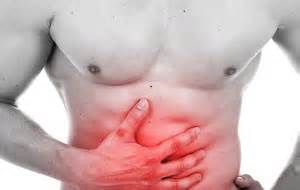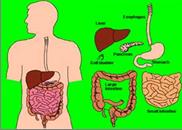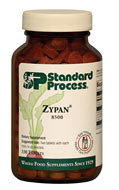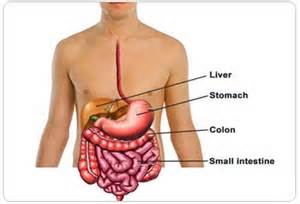Digestive Problems Cause Havoc
Over Entire Body
Over Entire Body

If the body isn't making enough acids and enzymes to digest the fats, carbohydrates, minerals, vitamins and proteins then function of every single system suffers and food will stay in your stomach for long periods of time. Your food will rotten and produces organic acid which burn and damage the delicate stomach lining. This causes heart burn. It also releases gases which bubble up causing "gas" and bloating. If it persists long enough it weakens the valve between the stomach and esophagus and eventually you get "GERD" (Gastro-Esophageal Reflux Disease) or commonly referred to as "reflux".
Heart burn and reflux are the result of a DEFICIENCY of the proper acids in the stomach - a deficiency of hydrochloric acid. It is not a generalized acid excess - it is the result of too few of the good acids resulting in too many of the bad acids. Drugs such as Tums, Pepto-Bismol work by absorbing the bad fermentation acids along with the good, already-in-short-supply acid enzymes.
Drugs actually stop the body from secreting these precious acids and enzymes, perpetuating the malfunctioning digestive system even further. When food ferments instead of enzymatically digesting, the pH of the chyme, instead of dropping to 1.0 to 1.2, a normal stomach pH, only drops to 4.5-5.0. Thus, when the chyme enters the duodenum, it is not acidic enough to trigger the receptor sites.
The enzymes from the pancreas and gallbladder do not get released, and the chyme never neutralizes. The chyme which is now not acidic enough to trigger the receptor sites, yet too acidic for the delicate lining of the intestines, flows through the rest of the digestive tract causing new problems. Food remains in the gut undigested, fermenting, attracting water, and producing volumes of gas and a variety of acids. This condition causes severe indigestion, gas, and even allergic reactions and called indigestion and malabsorption.
These acids at first irritate stomach, producing acid reflex, then damage and eventually destroy the delicate linings of the intestines. Mucus, produced by goblet cells in your intestine, is your body’s defense, become inflamed from years of consuming damaging foods as well as the lining of your intestine. While some mucus following a temporary inflammation of the gut is normal, years of this mucus accumulates into a stale sludge. As the damage continues and the mucus continues to build up, less and less absorption is possible. Eventually, whole food is passed through the gut with little absorption.
As more and more mucus is produced and less and less food is absorbed, more and more fluid accumulates in the gut. Given a lifetime of drugs, insufficient acid digestion in the stomach, and poor diet, the wear and tear to the intestinal lining can even damage the goblet cells. Without protective mucus, inflammation occurs. All of these symptoms are a result of the biochemical changes associated with the body’s inability to properly digest certain foods. It can cause more than a lifetime of painful, bloody, mucus-filled bowels with eventual surgical loss of the colon itself.

In the intestine, undigested protein undergoes putrefaction, giving off poisons like a constipation toxin, and histamine (an allergen that causes allergies, hives, and more) and imbalanced micro flora. That process is very different from the way adequately digested and liquefied proteins enter digestive tract - as amino acids, which are needed to build a strong, healthy body.
When the beneficial bacteria get destroyed the opportunists get a special opportunity to grow into large colonies and occupy large areas of the digestive tract. A modern diet of processed and fast foods provides perfect nourishment for these pathogens. As a result of all these factors we have seriously compromised gut flora. If we don’t acquire normal balanced gut flora, then we will not digest and absorb foods properly, developing multiple nutritional deficiencies and a lot of digestive problems that lead to a huge number of chronic conditions.
If the gut flora is damaged, the best foods and supplements in the world may not have a good chance of being broken down and absorbed. A good example is dietary fiber, which is one of the natural habitats for beneficial bacteria in the gut. Beneficial bacteria feed on it, producing a whole host of good nutrition for the gut wall and the whole body; they engage in absorbing toxins, they activate to take part in water and electrolytes metabolism to recycle bile acids and cholesterol, etc.
It is the bacterial action on dietary fiber that allows it to fulfill all those good functions in the body. And when these good bacteria are damaged and are not able to work the fiber, dietary fiber itself can become dangerous for the digestive system, providing a good habitat for the bad pathogenic bacteria and aggravating the inflammation in the gut wall. This is when gastroenterologists have to recommend a low-fiber diet. Consequently, dietary fiber alone without the beneficial bacteria present in the gut can end up not being all that good for us.
At the same time, if the bile is not flowing properly, gets thick like cream and does not flow smoothly, the fat can’t be digested properly and the toxins cannot removed from the body. Bile needs to be thin and decongested, other whys we can’t lose weight permanently, release toxins and digest fat well. Main symptoms of bile congestion or bile deficiency are persistent constipation, nausea and allergy.
- Why poor gut health causes weight gain
- What connection between gut functions and your thyroid
- How your thyroid causes diarrhea or constipation
- How stress affects your gut health
- Why your poor gut health disturbs the way you think and behave
- Why your poor gut health upsets the way you look
- What connection between gut functions and your skin
- What connection between gut health and diabetes











